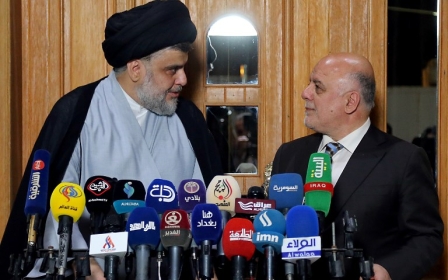Iraq PM orders swift executions of Islamic State militants on death row

Iraqi Prime Minister Haider al-Abadi on Thursday ordered the immediate execution of hundreds of convicted militants on death row, in swift retaliation for the Islamic State (IS) group’s execution of eight captives.
Abadi vowed on Thursday to avenge the deaths of the IS captives, a day after their bodies were found along a highway north of Baghdad.
"Our security and military forces will take forceful revenge against these terrorist cells," Abadi told senior military officials and ministers.
"We promise that we will kill or arrest those who committed this crime," he said.
The bodies of the eight were found mutilated and rigged with explosives, said Lieutenant General Muzher al-Azawi, commander of Diyala operations.
Iraqi authorities executed 12 militants on death row shortly after Abadi's statement.
Abadi, who has faced charges of failing to respond in force to IS, ordered "the immediate punishment of terrorists condemned to death whose sentences have passed the decisive stage", his office said, referring to convicts whose appeals have been exhausted.
More than 300 people, including around 100 foreign women, have been condemned to death in Iraq and hundreds of others to life imprisonment for being members of IS, a judicial source said in April.
Most of the convicted women are Turkish or from former Soviet republics, while a Russian man and a Belgian national are also on death row.
There has been a rise in attacks by the militant group in recent weeks, especially on a highway connecting the capital Baghdad with the country's north, where the men had been seized.
They included six abductees who had appeared in an IS video with badly bruised faces. IS claimed they were Iraqi police officers or members of the Hashd al-Shaabi paramilitary force, which played a role in IS’s retreat.
In the video posted on Saturday by the Amaq propaganda outlet of IS, the militants threatened to execute their captives unless Baghdad released Sunni Muslim women held in its prisons within three days.
But Abadi said autopsies indicated the captives were already dead when the recording was posted and that "the terrorists posted the video to try to dupe us".
Security and medical sources said the bodies were taken to a hospital in Tuz Khurmatu, a town south of the oil city of Kirkuk, where they were being prepared for burial.
The change of tone from the prime minister came after criticism on social media of his failure to react forcefully to the grisly discovery.
Iraq declared victory over IS in December, after expelling the militants from all urban centres including the country’s second-largest city, Mosul.
Iraq, which has repeatedly faced criticism over the numerous death sentences handed down by its anti-terrorist courts, hanged at least 111 convicts in 2017.
About 20,000 people were arrested in the three-year battle by Iraqi forces to evict IS, which had seized swathes of western and northern Iraq in 2014.
Human Rights Watch (HRW) last week urged Iraq's judiciary to deal with foreign women and children affiliated with IS on a case-by-case basis instead of slapping them with "one size fits all" sentences.
Since January, HRW said Iraq's judiciary had "proceeded with rushed trials against foreigners on charges of illegal entry and membership in or assistance" to the militant group.
Most foreign women had been sentenced to death or life in prison and children aged nine and above to between five and 15 years in jail for taking part in violent acts, it said.
Middle East Eye propose une couverture et une analyse indépendantes et incomparables du Moyen-Orient, de l’Afrique du Nord et d’autres régions du monde. Pour en savoir plus sur la reprise de ce contenu et les frais qui s’appliquent, veuillez remplir ce formulaire [en anglais]. Pour en savoir plus sur MEE, cliquez ici [en anglais].




